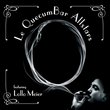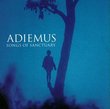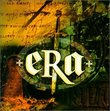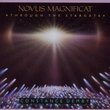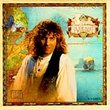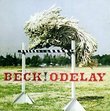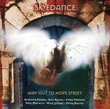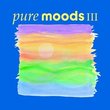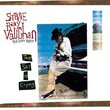| All Artists: Adiemus Title: Adiemus IV: Eternal Knot Members Wishing: 0 Total Copies: 0 Label: Higher Octave Original Release Date: 1/1/2000 Re-Release Date: 1/23/2001 Genres: International Music, New Age, Pop, Soundtracks, Classical Styles: Celtic, Celtic New Age, Meditation, Historical Periods, Modern, 20th, & 21st Century Number of Discs: 1 SwapaCD Credits: 1 UPCs: 724384996529, 0724384996550, 2605000025367, 724384996550 |
Search - Adiemus :: Adiemus IV: Eternal Knot
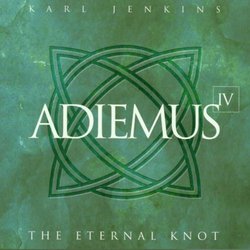 | Adiemus Adiemus IV: Eternal Knot Genres: International Music, New Age, Pop, Soundtracks, Classical
When British composer Karl Jenkins launched Adiemus with the Songs of Sanctuary album in 1995, it was a fresh and exhilarating take on global music. Jenkins used choral vocals similar to Enya's, but spiked with a language ... more » |
Larger Image |
CD DetailsSynopsis
Amazon.com When British composer Karl Jenkins launched Adiemus with the Songs of Sanctuary album in 1995, it was a fresh and exhilarating take on global music. Jenkins used choral vocals similar to Enya's, but spiked with a language of the imagination (merging African and Latin phonemes) and stoked by Jenkins's pastoral arrangements. Never wholly original--Lisa Gerrard and Elizabeth Fraser had already worked out fantasy vocal designs and the 1960s African mass "Missa Luba" effected a similar choral/African/Latin sound--Adiemus nevertheless found a new take on English composers' penchant for choirs. However, after six years and four albums mining this vein, Jenkins's sound rings more hollow with each recording. The Eternal Knot is drawn from Jenkins's soundtrack to a BBC documentary called The Celts. You might recall that Enya also evolved her sound in the late 1980s doing a soundtrack for another documentary called The Celts. Taking his titles from the Celtic legends that populate the documentary, Jenkins orchestrates cinematic landscapes full of swelling crescendos and dynamic cadences. Less oppressive than the heavily orchestrated Adiemus II, The Eternal Knot still wears thin. He casts Miriam Stockley's voice into a boys-choir register, turning her staccato phonemes into incessant prattle. But when she's in her warmer middle range, her layered voice is enveloping. Despite the theme of the album, Celtic music is only used as an occasional touchstone, with uilleann piper Davy Spillane, a few bodhran-style percussion grooves, and harpist Catrin Finch providing some relief from Jenkins's string-laden classical pretensions. --John Diliberto Similar CDsSimilarly Requested CDs
|
CD ReviewsEnya's "The Celts" Did Much Better The Fingers On My Keyboard | 01/24/2001 (2 out of 5 stars) "I have been hearing bits and pieces of news regarding Karl Jenkins as one of the greatest orchestral/New Age musicians of the decade for quite some time now. I have also enjoyed a few pieces of his music in the Adiemus series, but never had I actually bought and listened to an entire album. With his forth release - "The Eternal Knot" - my love for Celtic music overwhelmed me, and I was quite excited to listen to a full-length Adiemus album, fashioned to my liking!Admittedly, I expected too much, and I was mildly disappointed. For starters, I think Karl should revamp his style of strong strings and percussion backing up choral vocals, because it's starting to lack punch. Unlike one of his earliest releases (or was it his first?) - "Adiemus", which had a very dreamy, hypnotic and lulling feel to it - the music on "The Eternal Knot" has the listener hardly stirring emotionally, aside from catchy or humorous tunes. After the majestic but not-quite-there opening track "Cu Chullain", those pleasant and playful melodies to look out for are "Palace of the Crystal Bridge", "King of the Sacred Grove", "Saint Declan's Drone" (you'll love this one over and over again...), "Connla's Well" (the trivial title gives way to a tantalizing composition), "Ceridwen's Curse" and "Isle of the Mystic Lake". These are tracks that should bring Adiemus to its next level in musical variety, after its try at African music.But, alas, even the title track doesn't jolt you! Tracks like "The Dagda" and "The Wooing of Etain" could lull you to sleep with their monotonous lengths, and others like "Salm O `Dewi Sant'" prove ineffective in putting Irish traditional instruments to good use.Overall, this soundtrack emphasizes the power of even a simple, basic tune. Enya's "The Celts" was very skeletal in its music, but the tunes were so beautiful they made you sit up and marvel at their wonderfully creative simplicity. Yet with all the instruments Karl Jenkins could have made better use of, he just had to spin out another record that shames the rest of the Adiemus series." THE ETERNAL KNOT - DIFFERENT BUT NEVERTHELESS ENJOYABLE nrp4ever | phoenix, az United States | 01/29/2001 (4 out of 5 stars) "When I first heard Adiemus "The Eternal Knot" I was a bit taken back by the Celtic feel to the album only because I didn't expect it. However, "The Eternal Knot' feels like a return to Adiemus "Songs of Sanctuary". The raw tribal feeling has returned only with a Celtic twist. There is still a hint of a classical influence to Eternal Knot but it is not overwhelming.To put it simply I love Adiemus and this album was very enjoyable.Track One, CU CHULLAIN, is very energetic. It reminds me of "In Caelum Fero" it has that same drive and power behind the music and vocals used. My personal favorites are track 5 "KING OF THE SACRED GROVE", tarck 4 "THE WOOING OF ETAIN". My favorite track however on Eternal Knot would have to be track 11 "CERIDWENS CURSE", This song is very different, even for Adiemus. What makes CERIDWENS CURSE exceptional is the accoustic guitar used during what appears to be the chorus combine that with the singers of Adiemus and we have a upbeat and delightfully wicked song.You either love or hate Adiemus and The Eternal Knot is no exception." The most reluctant 3-star review I'll probably ever give! absaraka | Pikesville, MD United States | 02/09/2003 (3 out of 5 stars) "First things first: I am a HUGE fan of Adiemus (own all their albums), Miriam Stockley, and Karl Jenkins. I'd been following the buildup to this album's release, and when I first read it was going to be a soundtrack, I cringed. "Adiemus? Doing a SOUNDTRACK?" I braced for the worst.It wasn't as horrible as I thought it would be, but it is FAR below earlier Adiemus albums. It starts out all right: "Cu Chullain" is a VERY good piece throughout, and comes close to being worth the price of admission all by itself. The rest of it, however...The title cut has a very grating, over-loud, fortissimo section toward the end that does not work for me. "Palace of the Crystal Bridge" is admittedly fun, but it doesn't hold up to repeated listenings: I used to love it, but now I usually skip it. "The Dagda" has a KILLER intro, but it wears out its welcome after almost eight minutes.Is this a *bad* album? Not at all! In fact, if you haven't heard any of Adiemus's albums before, you might want to give this one a listen, knowing that the rest are even better. It's not horrible by any stretch of the imagination, it's just not up to Karl's stellar efforts on earlier Adiemus albums."
|

 Track Listings (14) - Disc #1
Track Listings (14) - Disc #1![Goodbye [US CD]](/images/no_cover/m.png?v=15401716)
